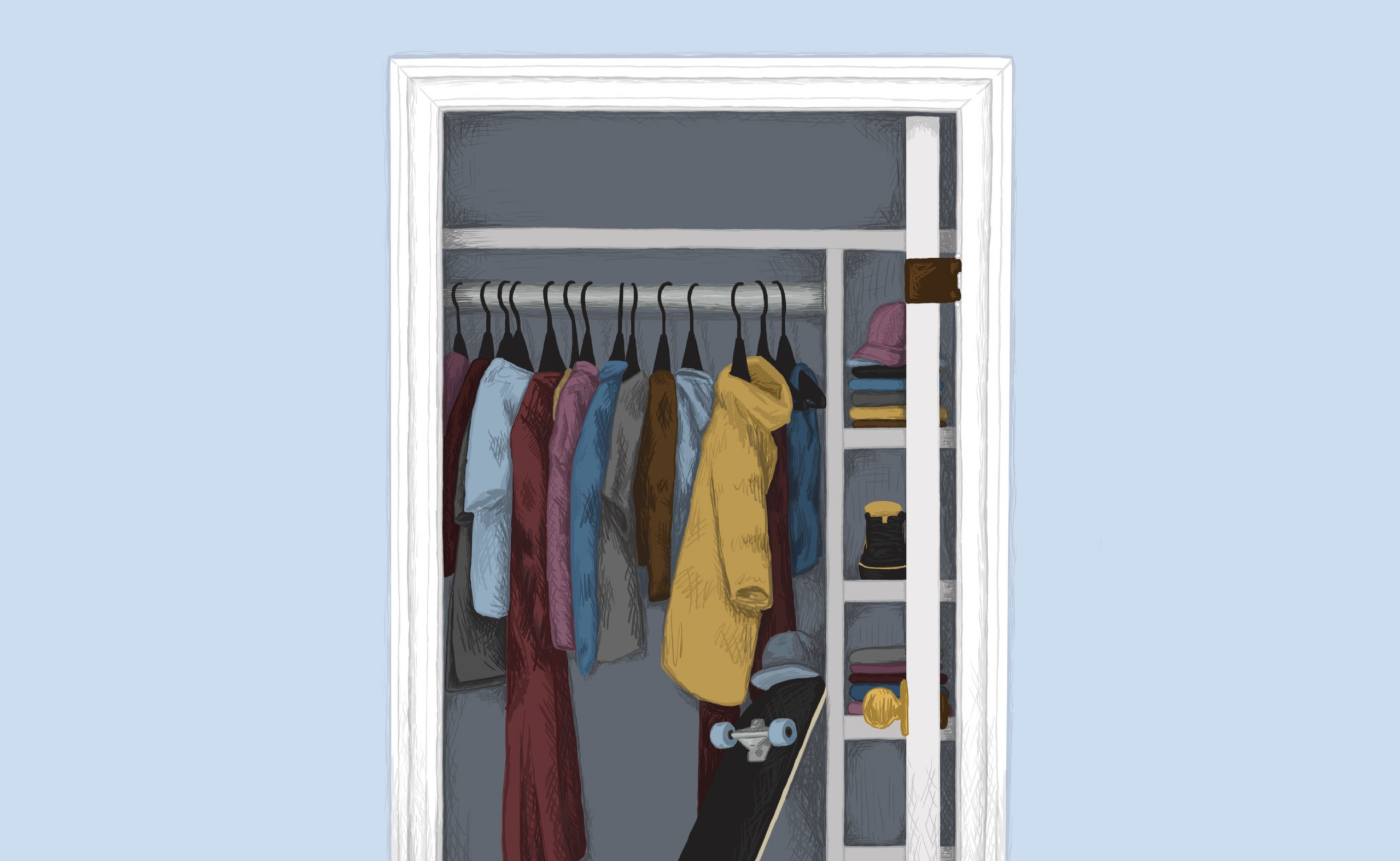Babcia
Women are often the managers of Polish households. They raise the children, cook, clean, control the finances, and create welcoming atmospheres for all friends and family who visit. With elegance and etiquette, Polish wives tend to act as delicate dictators around their husbands and tough mothers towards their kids. Their love is often revealed through open conversations on independence, respect, and personal boundaries. They offer intimidating side-eyes that remind their children to spew forced “hellos” and “pleases” and “thank yous” around strangers. “I love you” is not often a phrase that is heard in the house, but it is one that is felt through family karaoke nights, laughter, and hot soup on hot summer days.
Babcia, my grandmother, was not the type to knit sweaters and chat for hours about her past. She was an elegant woman, her blouses coated in floral perfume, her lips lined with ruby red lipstick, and her nails manicured without a single chip. She had strong opinions and loved to share them with the family—even when nobody listened to her half-hour speeches on the “devilish” influences on modern society. Her name was Kristina.
Babcia’s house smelled of freshly peeled potato skins and clean linens. The hardwood floors squeaked as you entered through the aged wooden door. Framed portraits of every grandchild lined the shelf that led into the living room. A fleece-like mat pillowed my feet when I took off my sneakers. Babcia gave warm hugs with slobbery cheek kisses. I always tried to pull away.
“You’re not going anywhere,” she would say in Polish.
Happy tears flooded her golden eyes and sometimes made her mascara bleed. She called me her “żabka,” which translates to “small frog,” a strange yet affectionate phrase. I grew up to be the same height as her.
We didn’t see Babcia often. She, Dziadek (my Grandpa), and the rest of my aunts, uncles, and cousins stayed in Poland after Mama decided to move to Canada with Tata (my Dad). For years, we visited as frequently as we could—every summer or every other summer. But one year turned to three years and then to four. I learned to appreciate the pixelated Skype versions of Babcia and Dziadek, and they learned to accept that my behind-the-screen life was only a glitchy retelling amid “can you hear me” and “can you see me.” The real, not-so-graceful me was left for my parents to witness.
Growing up, I wasn’t the “typical” girl. I despised wearing nail polish, playing with Barbies, and putting on dresses. When I was nine years old, I taught myself how to skateboard, wore unmatched pairings of snapback caps and chunky DC shoes, and collected fuzzy green caterpillars that I homed in plastic dollar store habitats. My parents supported this version of me—minus the caterpillars. They let me embrace my “tomboy” self as long as I respected their rules, brought home grades above a B+, and went to church every Sunday with brushed hair and rip-less pants. Babcia, on the contrary, never offered a compliment when I modelled graphic tees and Osiris shoes for her on Skype.
“Why would you wear that?” she’d ask, her lips pursed. “What does Mama say about this look?”
“She likes it!” I’d say, though Mama sat silently in the background.
Mama didn’t want me to stand out for the wrong reasons. But unlike Babcia, Mama knew I refused to change. Slowly, she became less bothered by the not-so-elegant me and even encouraged a few “tomboy” habits. She bought me my first and only pair of Heeleys, got Tata to paint my bedroom blue, and only made one snarky comment—as opposed to a whole spiel—when Tata bought me a BMX bike. Babcia’s opinions often silenced her own. Still, Mama continued to try and impress her own mother.
“It’s just a time in her life,” Mama would reassure Babcia. “She will grow out of it.”
I never did. Eventually, Babcia replaced her judgmental words with unsatisfied head shakes and deep sighs. I had a hard time understanding why physical appearance was so important to Babcia. She wasn’t always the perfect “girly girl,” so why did she expect me to act like I was?
When I visited Babcia and Dziadek in the summer of 2013, we took their old hook-on trailer to a local campsite along the Warta River. Babcia brought baggy grey joggers, rubber sandals, and gardening shovels to dig catholes. I never knew she could handle the wilderness until that summer. I watched her skewer sausages on sticks and go two days without brushing her hair. She laughed, smoked, and sang more than she ever had before. Her girly-ness was non-existent. She was beautiful and carefree. The old ladies from church that whispered crude gossip and spotted every above-the-knee skirt in the congregation were far away, in the city. There was not a single beauty standard to uphold. Babcia was naturally herself—a kind-hearted, bulky-toothed little lady with an unapologetic sailor’s mouth.
That camping trip also brought out Babcia’s competitive side. When Dziadek went out to fish in the mornings, Babcia and I sat under the trailer’s roll-out awning, ate open-faced tomato and ham sandwiches, and played card games. Our favourite was “tysiąc,” which translates to “one thousand,” a popular Polish trickster game of sly card placements.
“You can’t fool me,” she would say when I tried to fumble with my deck to put down an extra card. Her cartoon eyes widened before she made her next move.
“And BOOM,” she’d shout. The plastic table wobbled as she slammed down her hand. “One thousand!” Her winning smile made me forget that I’d lost.
“Let’s play again,” I’d say. “There is no way you’ll win again.” If there was a single piece of tomato left on my plate, Babcia made sure I ate it before she reshuffled the deck.
Dziadek returned with live fish in white buckets. He wafted Babcia away as he skinned their scales and chopped their tails in preparation for the campfire.
“Give me those,” she said. “Let me finish.”
She buzzed around him like a mosquito. After some bickering about “who scales fish better,” Babcia finally took hold of the knife. Dziadek sat beside her in a fold-out chair, watched, and occasionally commented under his breath. Babcia always got her way. Her fiery, assertive attitude did not resemble her often elegant appearance.
Those summer days encouraged me to reflect on the binary between masculinity and femininity. I have had a hard time understanding its significance in cultures, especially in relation to the physical portrayals of women. I asked Mama about this recently.
“Why do Polish women care so much about what they wear? Everyone looks like a Barbie, even at the supermarket,” I said after noticing the apparel in Poland.
“They need to fit in,” she said. “Elegance is ingrained in us since we are young. Nobody wants to be the talk of the town for wearing something unflattering.”
“So you’d never wear pajama pants to Walmart?” I said and laughed.
Mama gasped.
“Never.”
Babcia never had a glittery wardrobe, nor a pink bedroom. She did not fall into the stereotypical “girly girl” category—even though she thought she did. Her Polish roots graced her with strength, decisiveness, and unapologetic humour—qualities that many would call “masculine,” but I call badass. Her physical elegance was only a manifestation of the stereotypical gender norms she was taught.
Though the binary between masculinity and femininity still exists, it is slowly disappearing. The old sayings that “women must be graceful” and “women must appear attractive to their husbands” are gradually replaced with “women are individuals with identities that may not fit the status-quo.” Elegance no longer equates to etiquette—at least, in some cultures. While many Polish women remain classy and typically “feminine,” those that decide to wear pants to Sunday mass are no longer given the side-eye. The little girls that skateboard, cut their hair short, and scab their knuckles are not expected to change, because why should they?
Dziadek now lives alone in the same house that he and Babcia shared. When I last visited in the summer of 2019, the door continued to squeak, and the framed pictures of the family’s grandchildren continued to shine. Dziadek peeled and boiled potatoes the same way that Babcia did. He didn’t say anything about the dirty sneakers I wore when I entered the house.
“Let me show you something,” he said.
I followed him into the bedroom. Dziadek pulled out a thin gold ring from the back corner of the closet. He placed it in my hand.
“Here,” he said. “Babcia wanted you to have it. Between you and me, you were her favourite grandchild.” He laughed.
“Me?” I asked. “I thought Babcia didn’t like how I looked or acted.”
He paused for a moment and smiled.
“She loved that you were yourself,” he said.
Arts & Entertainment Editor (Volume 49) | arts@themedium.ca — Julia graduated in 2022 with a major in English, and a Professional Writing and Communications and Drama double minor. She previously worked with The Medium as Theatre Erindale Correspondent for Volume 48. As the A&E Editor this year, Julia cannot wait to explore the wondrous world of arts and spark creative conversations amongst student writers. If she’s not writing, working, or spending too much money on overpriced iced coffees, you can find Julia singing tunes with her guitar, bingeing Netflix shows, or going on nature walks with her doggo Benji. You can connect with Julia on LinkedIn or Instagram.


